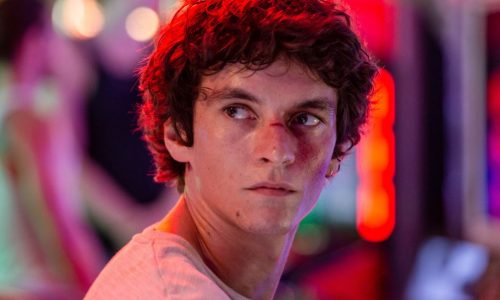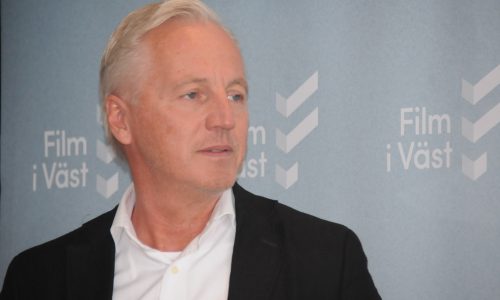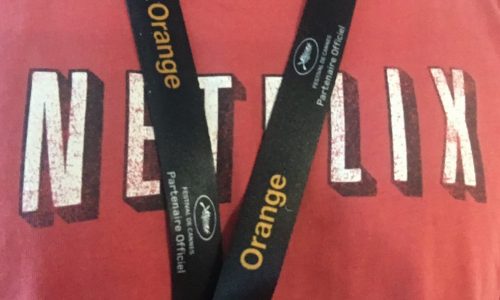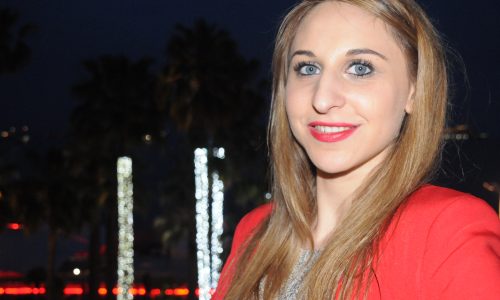The day started – early as usual – with a brisk trot down Boulevard Carnot, eating breakfast on the go, to try – for a third time – to catch Pedro Almodovar’s Pain And Glory. But for the third – and final time – I was to be denied the opportunity to see it. This screening was to be in the roof-top Soixantieme cinema and by the time I arrived, disappointed festival-goers were already streaming down the stairs, having been turned away due to it reaching capacity. Luckily, on this occasion, there was another film about to start, so I was dashed to the Un Certain Regard film Port Authority – based only on the fact that another critic I’d met on one of yesterday’s failed attempts to see Almodovar had asked when it was screening.

It stars Dunkirk‘s Fionn Whitehead as a young man who arrives in New York from Pittsburgh and finds himself with no-where to go when his sister turns him away from her door. Living in a homeless shelter and earning a paltry salary working for a homophobic friend as an unofficial bailiff – he tells others that he works in “moving” – he meets and falls in love with a trans woman from a world that couldn’t be any more different from his own. Most elements of this film have been seen before, in one sense or another, just not together in a single film, so although there’s little fresh from an emotional point of view, Port Authority – referring to a bus station in Manhattan – will be the first introduction that most viewers will have to the LGBT subculture of ballroom house. It’s an unconventional tale of honour and loyalty, as this lost soul is forced to choose between the homophobic gang – the only people to offer him any hospitality since he arrived in the city – and a trans lover, who’d never be accepted by the only friends his has.

Next came a rare trip out of Cannes, jumping on a mini-bus to a villa, perched on the cliffs above the Mediterranean, where Film i Väst, Sweden’s biggest film fund, was hosting a lunch to show off its wares – and for a small country in this global business, they were wares worth showing off. They were honoured to have been a producing partner on the festival’s opening film, Jim Jarmusch’s The Dead Don’t Die – as well as still, somewhat, living off the success of Ruben Östlund’s recent Palme d’Or winner The Square. Östlund himself was there to talk about his next project, The Triangle of Sadness, which he helpfully described as the wrinkles you get between your eyes when you frown, during a highly animated pitch of almost the entire film.
Three other directors, backed by the fund, then took the microphone to give details about their upcoming projects, although in the case of Tarik Saleh, wasn’t able to give many details at all. Having been expelled from Egypt, three days before the shoot on his previous film was due to begin – and remaining banned from entering the country, he said he needed to keep details of his next project under wraps, revealing only that it involved a religious university.

The head of Film i Väst, Mikael Fellenius, also set out how the fund hoped to help to reduce the impact of the film industry on climate change, by hiring an expert whose sole job is to consult on the subject, to ensure that every project it’s involved in – twenty nine this year alone – is as environmentally friendly as it can be. Suggesting, as examples, replacing diesel generators on sets or using more fuel-efficient transport, he acknowledged that this would only help at the margins. “But if everybody helps in the margin,” he insisted, “We’ll see good results very soon.” He believed that any increase in costs resulting from such changes wouldn’t affect overall budgets dramatically and insisted that it was necessary to do. It all seemed just a little over-earnest, perhaps, on a cold and rainy day.
Back in Cannes, I had a quick spin around the market and bumped into British film-maker Jonnie Hurn at the UK Film Centre. This year, he was there trying to help with the financing of a Belgium-based thriller set in an art gallery that is hoping to start shooting later this year. The pavilion itself was bursting at the seams as senior executives from BBC Films and Film 4 – moderated by Number Two at the BFI – had dozens of hopefully film-makers hanging on their every word as they outlined what kind of projects interested them. Despite the packed panel talk going on inside, there was still action under the tarpaulins on the beach-front back-terrace, where I bumped into someone I hadn’t met for years; Ed Sayers runs the Straight 8 competition, at which – next Monday – he’ll be screening the best 8 short films, shot entirely on a single reel of 8mm film.
Then I went, once more, to help out a friend with a bit more camera-work – his own crew will be arriving pretty much as the market is starting to wind up. Today’s thanks was somewhat lower key than the Rocketman party he sent me to last time – it was the Arab Cinema Critics Awards ceremony, which essentially amouted to a huddle of people in the corner of a rain-soaked marquee, while everyone else was enjoying wine at the bar.
Next, I headed to the press room to work on a radio piece I’d had commissioned by the “day job” back in London, but ended up – as is essential in Cannes – being distracted by a conversation between other British critics sitting at the next table. It’s this exchange of views, such vibrant and honest conversations, that often helps to refine people’s impression of a film.

One of the things about Cannes is that plans change, quickly and often. When I woke up this morning, I had two receptions lined up for this evening – one laid on by the sales agents California Pictures, through a director friend who’s worked with them, and another by Indie Rights, the American distributor of The Redeeming, a film by the British director Brian Barnes, which might be familiar to readers of this website. In the end, though, the Indie Rights party was cancelled, but two more events came up in its place.
The problem with things just coming up is that you have to be prepared for all eventualities, which leads to the engaging spectacle of some women attending morning screenings in flood-length dresses. And I wasn’t really dressed for parties, in jeans and a T-shirt. But I was prepared to risk it, rather than have to return to the apartment and change; the one positive thing about the rain is that if necessary, I could just zip up my waterproof and no-one would be any the wiser anyway.
But something that had already been happening all day stepped up a gear once I was surrounded by people filled with alcohol. Total strangers would come up to me and question why I was wearing a Netflix T-shirt in Cannes – given that Netflix and Cannes are not the best of friends. “I’m wearing it ironically,” I’d insist. But what a useful ice-breaker for parties – it was even more effective than the sling I’ve been wearing since I broke my collarbone last month, which was particularly useful when I bumped into Ken Loach earlier in the week; his arm was in a sling, but he wasn’t wearing a Netflix T-shirt.

One of the many conversations to spring from my ironic attire came at the California Pictures “hula” cocktail party in their third-floor apartment with a smokers’ balcony overlooking the Croisette. A young and delightfully enthusiastic British actress, Kelly Juvilee, told me about how she was in Cannes to help with the promotion of two films she’d been in that were being sold at the Cannes Film Market, which runs alongside the higher profile festival. She’s enjoying her first Cannes with a whole group of actors who’ve travelled down with Eaglestone Management. At the same party, I met a Canadian producer who turned out not only to know a Vancouver-based British film-maker I met through a former colleague but also a good Birmingham-based friend of mine from my university days – they say it’s a small world and the film world is certainly a small world.
This party reminded me of my earliest years at Cannes – young, fresh faces, bursting with optimism and hope that twenty years in Cannes can suck out of you, as they boast to each other about the great meetings they’ve had – in an apartment, rather than in a beach-club, with a help-yourself bring-a-bottle-bar and nibbles including crisps and breadsticks to dip into a jar of Nutella – they didn’t have that at the Rocketman party.
The next party was more at an in-between level. The Fort Lauderdale International Film Festival hosted its reception in a sizeable beach-front marquee, with plentiful drink, finger-buffet-type nibbles and a DJ, interspersed with live entertainment from “The Gipsy King Family” – not quite Sir Elton…and not quite The Gipsy Kings. There were no celebrities milling around, just film-makers and exhibitors from as far and wide as the US, Panama, Israel, Russia and New Zealand. Among them was Cameron Campbell, in Cannes to promote her own film festival, at Dunedin in western Florida – who wouldn’t want to come to a sunny Florida in January, she enthused.
But this party was less about talking shop and more about winding down and dancing after another hard day of – well – whatever it was the guests had been doing. That’s one of the strangest things about Cannes is that it’s so different for everyone.
